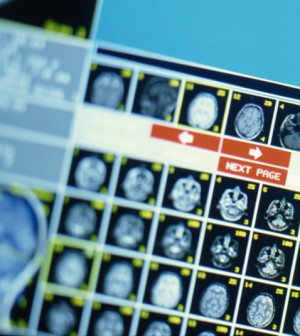- Double Mastectomy May Offer No Survival Benefit to Women With Breast Cancer
- Toxic Lead Found in Cinnamon Product, FDA Says
- Certain Abbott Blood Sugar Monitors May Give Incorrect Readings
- Athletes Can Expect High Ozone, Pollen Counts for Paris Olympics
- Fake Oxycontin Pills Widespread and Potentially Deadly: Report
- Shingles Vaccine Could Lower Dementia Risk
- Your Odds for Accidental Gun Death Rise Greatly in Certain States
- Kids From Poorer Families Less Likely to Survive Cancer
- Tough Workouts Won’t Trigger Cardiac Arrest in Folks With Long QT Syndrome
- At-Home Colon Cancer Test Can Save Lives
Health Highlights: March 14, 2014


Here are some of the latest health and medical news developments, compiled by the editors of HealthDay:
Graco Child Seat Recall Expanded
More than 403,000 child car seats have been added to the 3.8 million recalled last month by Graco Children’s Products.
Food and drink residue can jam the buckles on the seats and make it difficult to remove children. Some parents have had to cut the harnesses to free their children, and the U.S. National Highway Traffic Safety Administration says the defect increases children’s risk of harm in emergencies, the AP reported.
The NHTSA also wants Graco to recall 1.8 million infant seats that have the same buckles, but the company says that isn’t necessary because the whole infant seat can be removed from the car in an emergency, instead of having to unlatch the buckle to remove the child.
The current recall of 4.2 million child seats is the fourth-largest of its kind ever in the United States. Adding the infant seats would make it the largest such recall, the AP reported.
—–
Data Handling Problems in Stem Cell Study: Investigation
There was “inappropriate handling” of data in a stem cell study that was originally hailed as a breakthrough, according to an interim report from an investigation into the paper.
The authors of the study published in Nature in January claimed that dipping cells in acid could rapidly and cheaply convert them into stem cells. But other scientists could not reproduce the results and questions were raised about the images used in the study, BBC News reported.
The study was conducted at the Riken Center for Developmental Biology in Japan. Riken officials launched an investigation and their initial findings said that while there are concerns about how the data was handled, there is no evidence of research misconduct.
Earlier this week, one of the authors said the study should be withdrawn, BBC News reported.
—–
FDA Head Defends Approval of Zohydro Pain Drug
The controversial painkiller Zohydro fills an “important and unique niche” for treating pain, the head of the U.S. Food and Drug Administration said Thursday in defending the agency’s decision to approve the drug.
During questioning before a Senate committee, Dr. Margaret Hamburg said the pill met the government’s effectiveness and safety requirements, the Associated Press reported.
A number of lawmakers have criticized the FDA’s approval of Zohydro, which is the first pure version of hydrocodone, the most abused medication in the nation. One question is why Zohydro was not made in a way to prevent drug abusers from injecting or snorting it.
Such forms are still in the early stages of development, Hamburg said.
Currently, the only FDA-approved drug with features meant to reduce the risk of abuse is OxyContin, the AP reported.
Copyright © 2024 HealthDay. All rights reserved.










